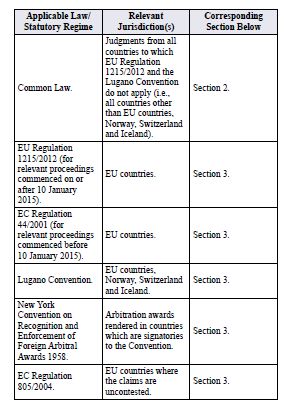1 Country Finder
1.1 Please set out the various regimes applicable to recognising and enforcing judgments in your jurisdiction and the names of the countries to which such special regimes apply.

2 General Regime
2.1 Absent any applicable special regime, what is the legal framework under which a foreign judgment would be recognised and enforced in your jurisdiction?
The general Common Law regime of the legal framework under which a foreign judgment, being civil or commercial (but not insolvency) judgments from all countries to which EU Regulation 1215/2012, EC Regulation 44/2001 or the Lugano Convention do not apply, which would be recognised and enforced in Ireland, is set out below. For the purpose of this analysis, therefore, 'foreign judgments' are judgments from countries other than EU/EFTA Member States.
Recognition and enforcement of a foreign judgment is pursued by way of commencing fresh proceedings by way of an originating High Court summons. Any fresh proceedings commenced are required to be issued by the Central Office of the High Court and served on the defendant/judgment debtor. For non-EU and non- Lugano Convention judgments, leave of the High Court must first be obtained to issue and serve the proceedings out of the jurisdiction. Order 11, Rule 1(q) of the Rules of the Superior Courts identifies that such leave may be granted in cases brought to enforce any foreign judgment.
As addressed below, since recognition and enforcement of foreign judgments is permissible only in respect of money judgments, a party seeking recognition and enforcement of a foreign money judgment may proceed by way of summary summons (which in domestic procedure is, inter alia, reserved for claims for a debt or liquidated sums).
2.2 What constitutes a 'judgment' capable of recognition and enforcement in your jurisdiction?
This depends on the applicable law or statutory regime. For enforcement pursuant to EU Regulation 1215/2012, EC Regulation 44/2001 and the Lugano Convention, those instruments themselves specify that they apply to judgments "whatever the judgment may be called, including a decree, order, decision or writ of execution, as well as a decision on the determination of costs or expenses by an officer of the court". Accordingly, what constitutes a judgment under those instruments is broad and includes orders or judgments in the nature of injunctions and costs determinations.
For enforcement at Common Law, what constitutes a judgment capable of recognition and enforcement is narrower. To be enforceable at Common Law, the relevant judgment or order must be final and conclusive from the court that pronounced it and it must involve a monetary award. The monetary award must either be in a specified and definite amount or it must be capable of straightforward arithmetical calculation.
2.3 What requirements (in form and substance) must a foreign judgment satisfy in order to be recognised and enforceable in your jurisdiction?
The relevant prerequisites to be met under Irish common law in order for a court to recognise and enforce a foreign judgment (being a judgment from a country other than an EU/EFTA Member State) are:
- the foreign judgment must be for a definite sum and, therefore, only money judgments may be enforced. Moreover, Irish courts will not enforce foreign revenue, penal or other public laws, whether directly or through the recognition of a foreign judgment;
- the foreign judgment must be final and conclusive, which means that it must be final and unalterable by the court that pronounced it. Even if an appeal is pending, the judgment may still be considered final and conclusive unless the appeal has the effect of staying the judgment; and
- the judgment against the defendant must be given by a court of competent jurisdiction. This means that the foreign court must have had "jurisdiction" under Irish conflict of law rules to deliver the final and conclusive judgment in respect of which recognition and enforcement is sought. Submission to the jurisdiction of the foreign court by the defendant will usually arise by virtue of a prior agreement to that effect or by participation in the foreign proceedings, or through presence in the jurisdiction at the time of the proceedings. Assertion of jurisdiction by a foreign court on the bases of nationality or allegiance of the defendant, the domicile of the defendant, reciprocity, the cause of action accruing in the foreign country or the possession of property by the defendant in the foreign country may not of themselves be sufficient bases for the Irish courts to accept that the foreign courts had jurisdiction. For recognition and enforcement of foreign judgments, a verified/ certified/sealed copy of the foreign judgment is required. If the foreign judgment is not in an official language of the State (i.e., English or Irish), it will need to be translated into either Irish or (more usually) English. If the foreign judgment has been obtained in default, proof of service of the judgment on the defendant/ judgment debtor will also be required.
2.4 What (if any) connection to the jurisdiction is required for your courts to accept jurisdiction for recognition and enforcement of a foreign judgment?
An insufficient connection to the jurisdiction is not a basis upon which to challenge jurisdiction where recognition and enforcement is sought pursuant to EU Regulation 1215/2012, EC Regulation 44/2001 and the Lugano Convention. The only grounds identified in those instruments for challenging recognition are summarised in question 3.4 below, and an insufficient connection to the jurisdiction is not one of them.
For enforcement of judgments and arbitral awards at Common Law, and subject to question 5.1 below, the recent case law states that a potential applicant should be satisfied that there is a "solid practical benefit" to bringing the enforcement proceedings in Ireland.
To view the full article please click here.
Previously published in The International Comparative Legal Guide
The content of this article is intended to provide a general guide to the subject matter. Specialist advice should be sought about your specific circumstances.


